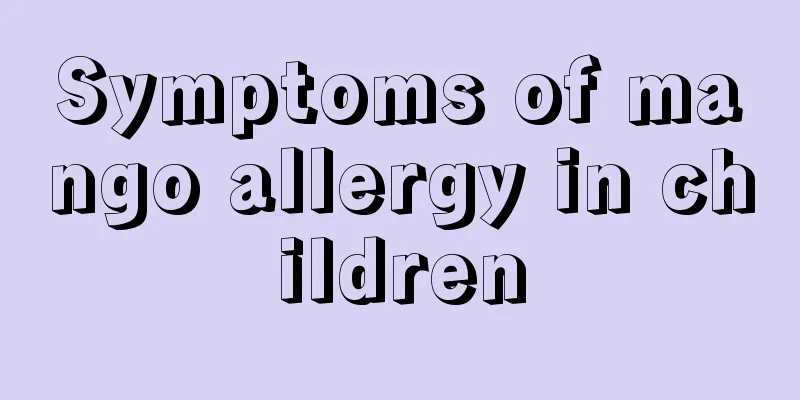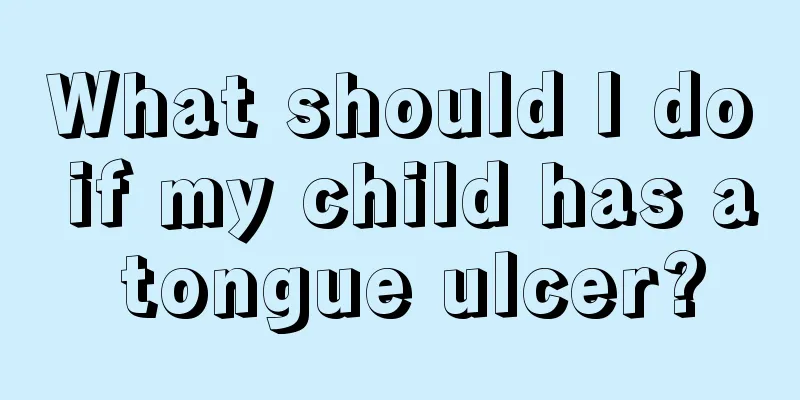Symptoms of mango allergy in children

|
Mango is a kind of fruit that grows mostly in tropical regions. It is yellow in color and the flesh is relatively sweet, but some people cannot eat mangoes because they will experience allergic symptoms. Children are more likely to suffer from allergies if they eat mangoes, because their immune system is not fully developed. After being allergic to mangoes, they will have symptoms such as redness, itching and peeling all over the body. The following is a detailed introduction to the symptoms of children's allergies to mangoes. 1. Mango allergy is a type of food allergy. Most of the allergic symptoms caused by eating mangoes are similar, with swollen lips, rashes on the facial skin, and blisters in the mouth. According to the doctor, the mango tree belongs to the Anacardiaceae family, and many of its ingredients may cause discomfort to people with allergies, especially unripe mangoes, which contain a higher proportion of ingredients that are prone to cause allergies. 2. "Mango dermatitis" usually occurs in areas that come into contact with mangoes but are not washed with water in time. It is more common around the mouth (bilateral corners of the mouth, upper and lower jaws or cheeks). The rash is evenly or irregularly distributed light red spots, and dense and small papules can be seen on the red spots. 3. Since mangoes contain a lot of irritating substances such as fruit acid, amino acids, and various proteins, it is easy for people to get mango juice on their mouths, cheeks, and other parts of their bodies when eating mangoes, which will irritate the facial skin and cause redness and inflammation of the face. In severe cases, redness and pain in the eyes will occur. Eat with caution. 4. A very small number of people will develop red spots all over the body, vomiting, diarrhea, etc. after eating mangoes. Such patients may have allergies and should not eat mangoes. And mango allergy is avoidable in most patients. When eating mangoes, most people are accustomed to peeling the skin and biting it directly, which makes it easy for the juice to get on the skin around the mouth or face. 5. Some people don’t care about having fruit juice on their faces. If fruit juice remains on the skin for a long time, it will irritate the skin and cause an allergic reaction. Therefore, when eating mango, it is best to cut the flesh into small pieces and put it directly into your mouth. After eating mango, you should rinse your mouth and wash your face to avoid residual juice. 6. Do not eat mangoes after a full meal, and do not eat them with spicy foods such as garlic. Otherwise, it may cause jaundice. Currently, the mechanism is still unclear, but this is a common experience. According to modern reports, there have been cases of nephritis caused by eating too much mango, so we should be careful. Mango leaves or juice may cause dermatitis in people with allergies, so be careful. 7. Mango is one of the few fruits rich in protein, and eating more of it can make you full easily. Traditionally, it is said to be good for the eyes and moisturize the skin, probably because it contains carotene. Its core can also be used as medicine, which can detoxify, eliminate stagnation and lower blood pressure. |
<<: Seven-month-old baby sweats a lot on his head when sleeping
>>: Symptoms of fever, cold and flu in children
Recommend
Spring recipes for kids
Children are in the stage of growing up, so as pa...
Red blood streaks on children's faces
Children's skin is very delicate and tender. ...
What are the developmental indicators for a one-year-old baby?
Each of us develops from a tiny fertilized egg an...
Methods of Chinese medicine massage for children
Children's immunity is very poor, and they ar...
Treatment of zinc deficiency in one and a half week old babies
Recently, many children have shown symptoms of zi...
What are the symptoms of enteritis in children?
Pediatric enteritis is actually a relatively comm...
How many months does the baby have obvious symptoms of hypothyroidism?
Hypothyroidism, also known as underactive thyroid...
Is herpes contagious in children?
Children's bodies are relatively weak and the...
What should I do if my three-year-old child has X-shaped legs?
X-shaped legs are a relatively common lower limb ...
Anemia in children
Anemia is a disease that occurs in the human body...
What should children eat to supplement nutrition?
What should children eat to supplement nutrition?...
What are the treatments for tooth decay in children?
Teeth are organs used to chew food and play a ver...
Treatment of nasal adenoid hypertrophy in children
Enlarged nasal adenoids in children is the most t...
One-year-old baby has a lot of phlegm and a hoarse throat
The symptoms of one-year-old babies with excessiv...
The child suddenly stopped talking
Many parents will find that their originally live...









